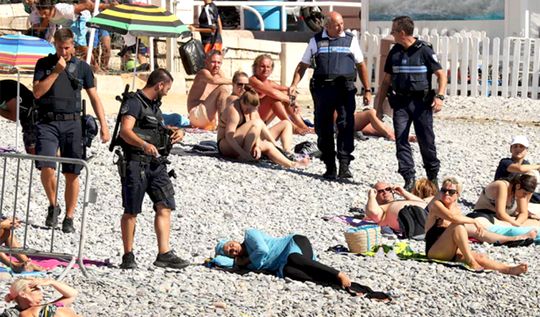Paris, Aug 24: The burkini, a body-concealing women's swimsuit that fits an Islamic dress code, has stirred a controversy in France.
In one of the recent cases of crackdown, a Muslim woman was forced to remove her burkini at a Nice beach.
Photos have emerged showing police confronting the woman in Nice on Tuesday. At least four police officers accosted a woman who was resting on the shore at the town's Promenade des Anglais, the scene of last month's Bastille Day lorry attack. Then she appeared to remove a blue garment.
A mother of two told AFP on Tuesday she had been fined on the beach in the resort of Cannes wearing leggings, a tunic and a headscarf.
Her ticket, seen by AFP, read that she was not wearing "an outfit respecting good morals and secularism".
"I was sitting on a beach with my family. I was wearing a classic headscarf. I had no intention of swimming," said the 34-year-old who gave only her first name, Siam.
A witness to the scene, Mathilde Cousin, confirmed the incident.
"The saddest thing was that people were shouting 'go home', some were applauding the police. Her daughter was crying," she told AFP.
Top French court to examine burkini ban
A ban on the burkini swimsuit by several French towns will come before France's highest administrative court on Thursday, the tribunal said.
The Human Rights League (LDH) is appealing a decision by a lower court in the Riviera city of Nice which upheld a ban on the outfit by the town of Villeneuve-Loubet.
Villeneuve-Loubet, just west of Nice, was among the first of some 15 French towns to ban the burkini, triggering a fierce debate in France and elsewhere about the wearing of the full-body swimsuit, women's rights and secularity.
The Nice tribunal ruled on Monday that the ban in Villeneuve-Loubet was "necessary, appropriate and proportionate" to prevent public disorder after a succession of jihadists attacks in France, including one in Nice on July 14.
The burkini was "liable to offend the religious convictions or (religious) non-convictions of other users of the beach," and "be felt as a defiance or a provocation exacerbating tensions felt by" the community, it added.
The ruling by the State Council, France's highest administrative court, will provide a legal precedent for towns to follow around the country.
The ban has raised questions over what constitutes unacceptable beachwear: the actual trademarked full-body swimsuit - much like a wetsuit but with a head covering - or merely being fully clothed on the seashore.
One of the world's most secular countries, France strongly separates religion and public life, and overt religious symbols or clothing are considered incompatible with French values.
Islamic dress has long been a subject of debate in France, which was the first European country to ban the Islamic face veil in public in 2010, six years after outlawing the headscarf and other conspicuous religious symbols in state schools.
However ordinary citizens are allowed to wear the headscarf in public.
The LDH and other rights groups believe the burkini ban is a "serious and illegal attack on numerous fundamental rights" including freedom of religion.
"It is the expression of a political project, a counter-society, based notably on the enslavement of women," French Prime Minister Manuel Valls said of the burkini Wednesday.





Comments
Add new comment